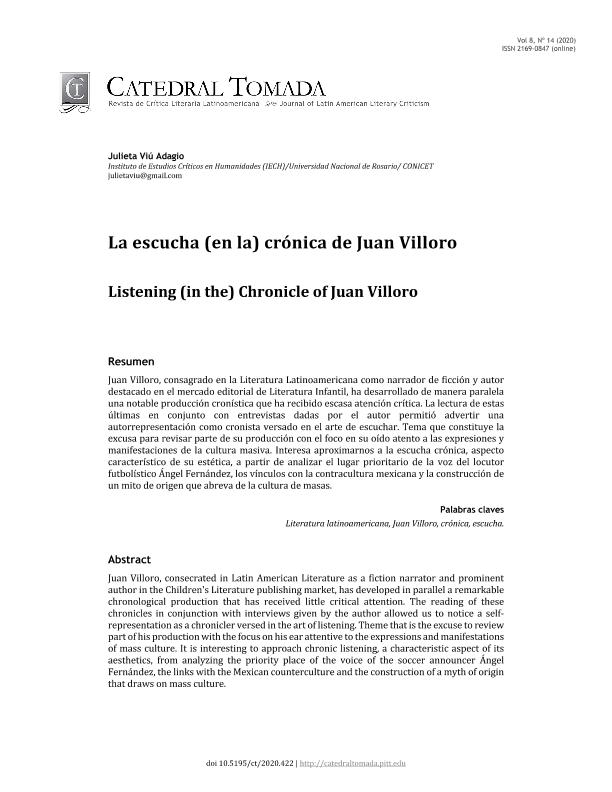Mostrar el registro sencillo del ítem
dc.contributor.author
Viu Adagio, Julieta

dc.date.available
2021-10-29T14:07:53Z
dc.date.issued
2020-08
dc.identifier.citation
Viu Adagio, Julieta; La escucha (en la) crónica de Juan Villoro; University of Pittsburgh; Catedral Tomada; 8; 14; 8-2020; 164-184
dc.identifier.issn
2169-0847
dc.identifier.uri
http://hdl.handle.net/11336/145459
dc.description.abstract
Juan Villoro, consagrado en la Literatura Latinoamericana como narrador de ficción y autor destacado en el mercado editorial de Literatura Infantil, ha desarrollado de manera paralela una notable producción cronística que ha recibido escasa atención crítica. La lectura de estas últimas en conjunto con entrevistas dadas por el autor permitió advertir una autorrepresentación como cronista versado en el arte de escuchar. Tema que constituye la excusa para revisar parte de su producción con el foco en su oído atento a las expresiones y manifestaciones de la cultura masiva. Interesa aproximarnos a la escucha crónica, aspecto característico de su estética, a partir de analizar el lugar prioritario de la voz del locutor futbolístico Ángel Fernández, los vínculos con la contracultura mexicana y la construcción de un mito de origen que abreva de la cultura de masas.
dc.description.abstract
Juan Villoro, consecrated in Latin American Literature as a fiction narrator and prominent author in the Children's Literature publishing market, has developed in parallel a remarkable chronological production that has received little critical attention. The reading of these chronicles in conjunction with interviews given by the author allowed us to notice a self-representation as a chronicler versed in the art of listening. Theme that is the excuse to review part of his production with the focus on his ear attentive to the expressions and manifestations of mass culture. It is interesting to approach chronic listening, a characteristic aspect of its aesthetics, from analyzing the priority place of the voice of the soccer announcer Ángel Fernández, the links with the Mexican counterculture and the construction of a myth of origin that draws on mass culture.
dc.format
application/pdf
dc.language.iso
spa
dc.publisher
University of Pittsburgh
dc.rights
info:eu-repo/semantics/openAccess
dc.rights.uri
https://creativecommons.org/licenses/by/2.5/ar/
dc.subject
Juan Villoro
dc.subject
escucha
dc.subject
crónica
dc.subject
contracultura
dc.subject.classification
Literaturas Específicas

dc.subject.classification
Lengua y Literatura

dc.subject.classification
HUMANIDADES

dc.title
La escucha (en la) crónica de Juan Villoro
dc.title
Listening (in the) Chronicle of Juan Villoro
dc.type
info:eu-repo/semantics/article
dc.type
info:ar-repo/semantics/artículo
dc.type
info:eu-repo/semantics/publishedVersion
dc.date.updated
2021-02-17T20:08:36Z
dc.journal.volume
8
dc.journal.number
14
dc.journal.pagination
164-184
dc.journal.pais
Estados Unidos

dc.journal.ciudad
Pittsburgh
dc.conicet.avisoEditorial
This work is licensed under a Creative Commons Attribution 4.0 International License.
https://creativecommons.org/licenses/by/4.0/
dc.description.fil
Fil: Viu Adagio, Julieta. Universidad Nacional de Rosario. Facultad de Humanidades y Artes. Instituto de Estudios Críticos en Humanidades. Consejo Nacional de Investigaciones Científicas y Técnicas. Centro Científico Tecnológico Conicet - Rosario. Instituto de Estudios Críticos en Humanidades; Argentina
dc.journal.title
Catedral Tomada
dc.relation.alternativeid
info:eu-repo/semantics/altIdentifier/url/http://catedraltomada.pitt.edu/ojs/index.php/catedraltomada/article/view/422
dc.relation.alternativeid
info:eu-repo/semantics/altIdentifier/doi/https://doi.org/10.5195/ct/2020.422
Archivos asociados
